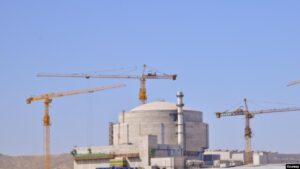by Sakina Ahmed 24 June 2023
Zulfiqar Ali Bhutto, who subsequently served as president and prime minister of Pakistan, began the country’s nuclear programme in 1972 while serving as minister of energy, power, and mineral resources. He started the programme with a gathering of scientists in Multan, soon after East Pakistan was lost in the war with India in 1971. Finally, after immense efforts and dedication nuclear tests were conducted on 28th May 1998. However, utilizing domestic uranium, Pakistan’s nuclear weapons technologies have developed separately from its civilian nuclear fuel cycles.
Pakistan’s ability to generate nuclear energy is restricted because the country is not a signatory to the (NPT) owing to its nuclear weapon programmes. With the help of China, six Nuclear Power Plants (NPPs) are now generating electricity. The country needs to move toward renewable and energy sources like nuclear sources which are cheap as well as environment friendly. This paper aims to highlight the benefits and need for peaceful uses of nuclear energy for Pakistan’s crippling economy.
Pakistan’s nuclear programme gained additional speed when India tested a nuclear “device” in 1974. Pakistan’s programme obtained delicate enrichment of uranium knowledge throughout the late 1970s. Dr Abdul Qadeer Khan’s entrance in 1975 greatly facilitated these initiatives. Dr Khan was a metallurgist with German training, and he carried with him expertise in gas centrifuge technology from his work at the secret Uranium Enrichment Facility in the Netherlands. The enemies of Pakistan will keep distance from engaging in any evil and hostile stances towards the country because of its nuclear weapons. Pakistan is liable for its nuclear assets and every working civilian administration has ensured the protection and security of the nation’s nukes via an efficient control and command system. In ranking of the Nuclear Security Index (NTI), Pakistan’s points have increased by 25 as a responsible nuclear security state.
A country can only develop steadily in an environment of security and safety because of an effective security framework, which aids the administration in maintaining an eye on all areas of society and the economy. The widespread consensus is that a nation’s defensive strategy and economic growth are intertwined. However, currently, the country needs nuclear energy because of its low cost and reliability. Pakistan has a circular debt of about $2.67 trillion despite the electricity price increase. It is because of using costly electricity sources like furnace oil, coal etc. The nuclear energy source is cheaper than other energy sources. But despite being cheap, its share is very less in Pakistan’s energy mix. The country has six nuclear power plants K1, K2 Chashm1, Chashma 2, Chashma 3, and Chashma 4. These plants are working under the International Atomic Energy Agency’s (IAEA’s) precautions. These NPP have saved around $6.828 billion concerning other costly thermal sources.
The benefits of nuclear power plants are that they are a low-cost energy source, these are consistent because they continuously produce energy, unlike solar which depends on the shining of the sun and wind which is dependent on the blowing of air. In addition, nuclear energy sources don’t emit carbon emissions which are hazardous to the environment. According to Nuclear Energy Institute (NEI) research, using nuclear energy prevents 470 million metric tons of CO2 from entering the atmosphere each year. Nuclear sources have a higher density of energy compared to other sources. The nuclear fission reaction released energy 10 times greater than the energy released by fossil fuels. The long-term aim of energy generation is to achieve nuclear fusion (the same mechanisms which power the reaction in Sun) if the nuclear fusion chain reaction continued and became manageable, we can have infinite energy.
To sum up, by 2050, Pakistan wants to have no emissions of carbon dioxide from its electricity industry. This objective will be greatly helped by Pakistan’s plan to meet one-fourth of its energy demands through nuclear energy by then. If money is spent on nuclear power, it could be contributing more to the national power. This objective is being hampered, though, by a lack of funding and nations’ reluctance to cooperate on civil nuclear issues. Export control organizations like the Nuclear Suppliers Group (NSG) should stop applying dual standards to civil nuclear cooperation and adopt a criteria-based policy. Also, international communities and climate scientists who are working to curb carbon emissions should take the initiative to help underdeveloped countries to get clean energy via nuclear sources under IAEA Safeguards.

